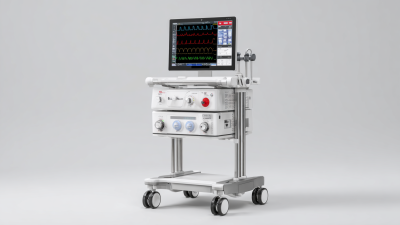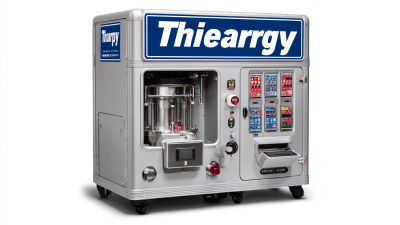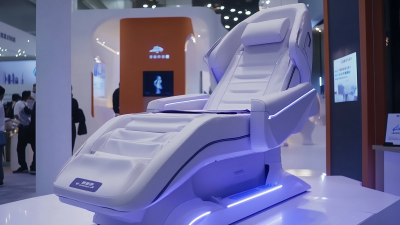Bankim Nagar, Siliguri, West Bengal
- GST NO. : 19BHDPS7640K1ZR
Ultimate Guide to Choosing the Right Emg Machine for Your Business Needs
In today's dynamic business environment, selecting the right EMG machine is paramount for professionals in fields such as rehabilitation, sports science, and neurology. This ultimate guide aims to navigate the complex landscape of EMG machines, providing a comprehensive comparison of various models based on functionality, ease of use, and cost-effectiveness. As electromyography continues to evolve, understanding the specific requirements of your practice or research can significantly influence your decision-making process. Whether you are a seasoned expert or a newcomer looking to invest in an EMG machine, this guide will equip you with the knowledge needed to make an informed choice that aligns with your business needs. Join us as we delve into the essential features, top brands, and critical considerations that will ensure you select the optimal EMG machine for your operational demands.

Factors to Consider When Selecting an EMG Machine for Your Practice
When selecting the right EMG machine for your practice, there are several critical factors to consider to ensure that the equipment meets your business needs. First, evaluate the machine's specifications, such as the number of channels, sensitivity, and data acquisition rate. These technical details dictate the machine’s capability in measuring and analyzing muscle activity effectively.
Tips: Make sure to choose a machine that offers flexibility in settings, so you can adapt the features based on different patient needs. Moreover, check if the EMG machine offers integrated software for easy data interpretation, as this will enhance your workflow and improve patient outcomes.

Another important factor is the user interface and training requirements. The usability of an EMG machine can significantly affect your staff's efficiency and productivity. A user-friendly interface allows for quicker training and minimizes the potential for errors during operation.
Tips: Before making a purchase, consider requesting a demo to evaluate how intuitive the software is and how easily your team can adapt to the machine. This hands-on experience can provide deeper insights that may not be apparent from specifications alone.
Essential Features to Look for in an EMG Machine
When selecting an EMG machine for your business needs, it’s crucial to focus on essential features that enhance its usability and effectiveness. One key aspect to consider is the acquisition system’s capability. A high-quality EMG machine should consist of advanced wearable sensors that provide accurate data collection in real-time. This feature is invaluable, especially in settings focusing on rehabilitation or movement analysis.
Tips: Ensure that the machine offers a user-friendly interface for both practitioners and patients. This will facilitate smoother operation during assessments and improve the overall experience for users. Additionally, look for EMG machines that integrate seamlessly with machine learning and AI technologies, as these advancements can enhance data analysis and clinical decision-making.
Another significant feature to look for is the machine's ability to conduct both invasive and non-invasive EMG techniques. Invasive techniques may be necessary for obtaining precise functionality assessments in patients with severe conditions. Conducting a thorough evaluation of these capabilities will help you choose a machine that aligns perfectly with your clinical requirements and patient care goals.
Comparing Different EMG Machine Brands and Models
When it comes to selecting the right EMG machine for your business, understanding the various brands and models is crucial. Each manufacturer brings unique features and capabilities to the table, making it essential to compare their offerings thoroughly. For instance, some brands focus on portability, providing lightweight devices ideal for clinics and in-field assessments, while others emphasize advanced technology, boasting software that enhances data interpretation and patient tracking.
Additionally, pricing can vary significantly between models, making it critical to assess your budget against the features that matter most to your practice. High-end EMG machines may come equipped with specialized sensors and superior analytical capabilities, but more affordable options might suffice for basic assessments. Evaluating user reviews and seeking out demonstrations can provide valuable insight into real-world performance. Ultimately, investing time in comparing different EMG machine brands will ensure you choose a device that meets your business needs efficiently.
Ultimate Guide to Choosing the Right Emg Machine for Your Business Needs - Comparing Different EMG Machine Brands and Models
| Model | Channel Count | Sampling Rate | Battery Life | Weight | Price Range |
|---|---|---|---|---|---|
| EMG-300 | 8 | 2000 Hz | 12 hours | 1.5 kg | $3000 - $3500 |
| EMG-500 | 16 | 1000 Hz | 10 hours | 2.0 kg | $4000 - $4500 |
| EMG-700 | 32 | 2000 Hz | 15 hours | 1.8 kg | $5000 - $6000 |
| EMG-900 | 4 | 1500 Hz | 8 hours | 1.2 kg | $2000 - $2500 |
| EMG-1100 | 12 | 2500 Hz | 20 hours | 2.5 kg | $6000 - $7000 |
Budgeting for Your EMG Equipment Investment
When budgeting for EMG equipment investments, businesses must carefully consider both initial costs and long-term benefits. Recent trends indicate a growing emphasis on innovative technologies across various sectors. For instance, the UK Ministry of Defence has mandated that 10% of its equipment budget be allocated to innovative tech, underscoring the importance of staying competitive through advanced solutions. This strategic approach can be mirrored in the healthcare sector, where investing in high-quality EMG machines can provide substantial returns through improved diagnostic capabilities and patient outcomes.
According to industry reports, businesses that prioritize investments in productive assets, such as EMG equipment, often see enhanced efficiency and profitability. For instance, small and medium enterprises have recently been incentivized to expedite their investments in machinery, thanks to faster tax deductions announced in the latest budget. This trend could encourage more businesses to embrace EMG technology sooner rather than later, enabling them to leverage state-of-the-art tools that can elevate their operational effectiveness and ultimately lead to a stronger competitive position in the market.
Maintenance and Support: What to Expect from EMG Machine Suppliers
When selecting the right EMG machine for your business, understanding the maintenance and support offered by suppliers is crucial. Industry reports indicate that approximately 30% of EMG machine users experience downtime due to inadequate support services. Hence, it's vital to assess the level of customer service and technical support available. Many leading suppliers provide 24/7 support, ensuring that any urgent issues can be resolved quickly, which helps maintain productivity.
Additionally, consider the warranty and maintenance packages that suppliers offer. According to a survey from the Biomedical Instrumentation Association, businesses that opted for comprehensive maintenance contracts reported 20% fewer device failures compared to those relying on standard warranties. This statistic highlights the importance of choosing suppliers that offer robust service contracts, including scheduled maintenance checks and access to replacement parts. By evaluating these factors, businesses can avoid potential disruptions and ensure the longevity and reliability of their EMG machines.

Related Posts
-

Understanding Global Manufacturing Standards for Best EMG Equipment
-

Top 7 Best Mobile Ecg Machines Transforming Healthcare Globally
-

Finding Quality Suppliers for Best Therapy Machines with a Practical Checklist Guide
-

Top Challenges When Choosing the Best EEG Equipment for Accurate Diagnosis
-

Top 10 Electric Therapy Machine Manufacturers from China Featured at the 137th Canton Fair
-

Unlocking Healthcare Innovations How Best EEG Machine in India Transforms Patient Monitoring

